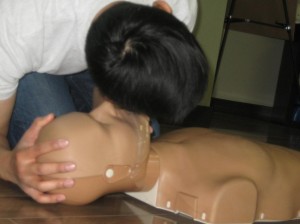Hypertension and heart disease

The make or break point when it comes to heart attacks is hypertension. People can go for years without feeling any signs and symptoms but when blood pressure suddenly rockets, that’s when most cardiac arrests happen. Hypertension is a chronic heart disease where the blood pressure is consistently high. Blood pressure is the pressure the heart and vessels need to overcome in order to send blood to the rest of the body.
But hypertension alone isn’t enough to cause a heart attack. The most common cause of cardiac arrest is CAD – coronary artery disease. A person is diagnosed with CAD when the arteries that supply the heart with blood become blocked with plaque (fatty deposits). Because of the plaque, the vessels become narrower, making it harder for blood to flow through. This in turn raises blood pressure, because there is more resistance in the blood vessels. In a hypertensive event, which can happen due to stress, strenuous activities, and eating certain food, the vessel can actually rupture.
What happens during cardiac arrest then?
Cardiac arrest is the medical term for a heart that has stopped beating. This is particularly dangerous because the heart is the organ that supplies the rest of our body with oxygenated blood. The body can survive up to several hours without blood in the right conditions but the brain cannot. After 10 minutes, the brain will start to experience irreversible damage.
Train in CPR to save a life.
The technique used in and out of the hospital to restart the heart is CPR. CPR stands for cardiovascular resuscitation; it uses three basic skills to get the heart beating again: compression, ventilation, and defibrillation. At Las Vegas CPR, we have two kinds of CPR programs available – basic and advanced. There are are also re-certification classes available for three of our programs. Because we want to make our programs the most accessible in the city, our programs are offered at the cheapest possible rates.
Basic Life Support training
- Heartsaver – A basic CPR and AED program for the general public; runs for 4 hours
- Heartsaver C – A basic CPR and AED program for health care providers (HCP); runs for 4.5 hours
- Basic Life Support for HCPs – A basic CPR and AED program that teaches one-person and two-person rescue; runs for 4.5 hours
Advanced Life Support training
- Advanced Cardiac Life Support – An advanced CPR and AED program that teaches medical management of adult victims; runs for 16 hours
- Pediatric Advanced Life Support – An advanced CPR and AED program that teaches medical management of pediatric victims (the program focuses on infants, toddlers, and younger children); runs for 14 hours
Once you complete training for any of the programs above, we award you with a CPR training credential. It is valid for two years before you have to take a re-certification class. We do not allow rescuers with expired certificates to sign up for re-certification; so remember to renew before the expiration date.
